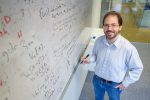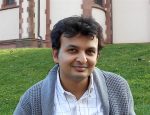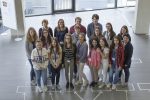News 2017
Research Spotlight: Teaching machine learning algorithms to be fair

Unfortunately, some recent investigations have shown that machine learning algorithms can also lead to unfair outcomes. For example, a recent ProPublica study found that COMPAS,
...Unfortunately, some recent investigations have shown that machine learning algorithms can also lead to unfair outcomes. For example, a recent ProPublica study found that COMPAS, a tool used in US courtrooms for assisting judges with crime risk prediction, was unfair towards black defendants. In fact, several studies from governments, regulatory authorities, researchers as well as civil rights groups have raised concerns about machine learning potentially acting as a tool for perpetuating existing unfair practices in society, and worse, introducing new kinds of unfairness in prediction tasks. As a consequence, a flurry of recent research has focused on defining and implementing appropriate computational notions of fairness for machine learning algorithms.
Parity-based fairness
Existing computational notions of fairness in the machine learning literature are largely inspired by the concept of discrimination in social sciences and law. These notions require the decision outcomes to ensure parity (i.e. equality) in treatment and in impact.
Notions based on parity in treatment require that the decision algorithm should not take into account the sensitive feature information (e.g., gender, race) of a user. Notions based on parity in impact require that the decision algorithm should give beneficial decision outcomes (e.g., granting a loan) to similar percentages of people from all sensitive feature groups (e.g., men, women).
However, in many cases, these existing notions are too stringent and can lead to unexpected side effects. For example, ensuring parity has been shown to lead to significant reductions in prediction accuracy. Parity may also lead to scenarios where none of the groups involved in decision making (e.g., neither men nor women) get beneficial outcomes. In other words, these scenarios might be preferred neither by the decision maker using the algorithm (due to diminished accuracy), nor by the groups involved (due to very little benefits).
User preferences and fairness
In recent work, to appear at NIPS 2017, researchers at MPI-SWS have introduced two new computational notions of algorithmic fairness: preferred treatment and preferred impact. These notions are inspired by ideas related to envy-freeness and bargaining problem in economics and game theory. Preferred treatment and preferred impact leverage these ideas to build more accurate solutions that are preferable for both the decision maker and the user groups.
The new notion of preferred treatment allows basing the decisions on sensitive feature information (thereby relaxing the parity treatment criterion) as long as the decision outcomes do not lead to envy. That is, each group of users prefers their own group membership over other groups and does not feel that presenting itself to the algorithm as another group would have led to better outcomes for the group.
The new notion of preferred impact allows differences in beneficial outcome rates for different groups (thereby relaxing the parity impact criterion) as long as all the groups get more beneficial outcomes than what they would have received under the parity impact criterion.
In their work, MPI-SWS researchers have developed a technique to ensure machine learning algorithms satisfy preferred treatment and / or preferred impact. They also tested their technique by designing crime-predicting machine-learning algorithms that satisfy the above-mentioned notions. In their experiments, they show that preference-based fairness notions can provide significant gains in overall decision-making accuracy as compared to parity-based fairness, while simultaneously increasing the beneficial outcomes for the groups involved.
This work is one of the most recent additions to an expanding set of techniques developed by MPI-SWS researchers to enable fairness, accountability and interpretability of machine learning algorithms.
References
Bilal Zafar, Isabel Valera, Manuel Gomez Rodriguez, Krishna Gummadi and Adrian Weller. From Parity to Preference: Learning with Cost-effective Notions of Fairness. Neural Information Processing Systems (NIPS), Long Beach (CA, USA), December 2017
Multiple Tenure-Track Faculty Openings
A doctoral degree in computer science or related areas and an outstanding research record (commensurate for the applicant's career stage) are required. Successful candidates are expected to build a team and pursue a highly visible research agenda, ...
A doctoral degree in computer science or related areas and an outstanding research record (commensurate for the applicant's career stage) are required. Successful candidates are expected to build a team and pursue a highly visible research agenda, both independently and in collaboration with other groups.
MPI-SWS is part of a network of over 80 Max Planck Institutes, Germany's premier basic-research organisations. MPIs have an established record of world-class, foundational research in the sciences, technology, and the humanities. The institute offers a unique environment that combines the best aspects of a university department and a research laboratory: Faculty enjoy full academic freedom, lead a team of doctoral students and post-docs, and have the opportunity to teach university courses; at the same time, they enjoy ongoing institutional funding in addition to third-party funds, a technical infrastructure unrivaled for an academic institution, as well as internationally competitive compensation.
The institute is located in the German cities of Saarbruecken and Kaiserslautern, in the tri-border area of Germany, France, and Luxembourg. We maintain an international and diverse work environment and seek applications from outstanding researchers worldwide. The working language is English; knowledge of the German language is not required for a successful career at the institute.
Qualified candidates should apply on our application website (apply.mpi-sws.org). To receive full consideration, applications should be received by December 1st, 2017.
The institute is committed to increasing the representation of minorities, women, and individuals with physical disabilities. We particularly encourage such individuals to apply. The initial tenure-track appointment is for five years; it can be extended to seven years based on a midterm evaluation in the fourth year. A permanent contract can be awarded upon a successful tenure evaluation in the sixth year.
Derek Dreyer receives Robin Milner Young Researcher Award

"Derek Dreyer has made deep, creative research contributions of great breadth. His areas of impact are as diverse as module systems, data abstraction in higher-order languages, mechanized proof systems and techniques, and concurrency models and semantics. ...
"Derek Dreyer has made deep, creative research contributions of great breadth. His areas of impact are as diverse as module systems, data abstraction in higher-order languages, mechanized proof systems and techniques, and concurrency models and semantics. He has refactored and generalized the complex module systems of SML and OCaml; devised logical relations and techniques that enabled advances in reasoning about higher-order imperative programs; and developed novel separation logics for modular verification of low-level concurrent programs. His research papers are a model of clarity and depth, and he has worked actively to translate his foundational ideas into practice – most recently with the RustBelt project to provide formal foundations for the Rust language. Additionally, Dreyer has contributed leadership, support, and mentorship in activities such as the PLMW series of workshops, which are instrumental in growing the next generation of PL researchers."
Previous recipients of the award have included Stephanie Weirich, David Walker, Sumit Gulwani, Lars Birkedal, and Shriram Krishnamurthi.
Amaury Pouly receives Ackermann Award
Amaury Pouly's thesis shows that problems which can be solved with a computer in a reasonable amount of time (more specifically problems which belong to the class P of the famous open problem “P = NP?”) can be characterized as polynomial length solutions of polynomial differential equations. ...
Amaury Pouly's thesis shows that problems which can be solved with a computer in a reasonable amount of time (more specifically problems which belong to the class P of the famous open problem “P = NP?”) can be characterized as polynomial length solutions of polynomial differential equations. This result paves the way for reformulating certain questions and concepts of theoretical computer science in terms of ordinary polynomial differential equations. It also revisits analog computational models and demonstrates that analog and digital computers actually have the same computing power, both in terms of what they can calculate (computability) and what they can solve in reasonable (polynomial) time.
Adish Singla to join MPI-SWS as tenure-track faculty

Adish Singla is joining us from ETH Zurich, where he has completed his Ph.D. in computer science. His research focuses on designing new machine learning frameworks and developing algorithmic techniques, particularly for situations where people are an integral part of computational systems. Adish joins the institute as a tenure-track faculty member, effective Oct 1, 2017.
Before starting his Ph.D., he worked as a Senior Development Lead in Bing Search for over three years. ...
Adish Singla is joining us from ETH Zurich, where he has completed his Ph.D. in computer science. His research focuses on designing new machine learning frameworks and developing algorithmic techniques, particularly for situations where people are an integral part of computational systems. Adish joins the institute as a tenure-track faculty member, effective Oct 1, 2017.
Before starting his Ph.D., he worked as a Senior Development Lead in Bing Search for over three years. Adish received his Bachelor's degree from IIT Delhi and his Master's degree from EPFL. He is a recipient of the Facebook Fellowship in the area of Machine Learning, the Microsoft Research Tech Transfer Award, and the Microsoft Gold Star Award.
Peter Druschel receives EuroSys Lifetime Achievement Award

Real-Time Systems group receives 3 best-paper awards in a row

Girls' Day 2017

The Max Planck Institutes for Informatics and Software Systems pursue basic research in many areas of computer science. But what exactly is computer science? And what does a day in the life of a scientist look like in computer science? We addressed these questions by way of hands-on examples and demonstrated, for instance, how a computer learns, how the car navigation system knows how to get from A to B, ...
The Max Planck Institutes for Informatics and Software Systems pursue basic research in many areas of computer science. But what exactly is computer science? And what does a day in the life of a scientist look like in computer science? We addressed these questions by way of hands-on examples and demonstrated, for instance, how a computer learns, how the car navigation system knows how to get from A to B, and also how one doesn’t always need a computer for doing computer science. Along the way, the school girls were able to ask our students and researchers all sorts of questions about what it is like to work in research.
--------
Die Max-Planck Institute für Informatik und Software Systeme betreiben Grundlagenforschung in vielen Bereichen der Informatik. Aber was genau ist Informatik? Und wie sieht ein Tag im Leben einer Wissenschaftlerin in der Informatik aus? Genau dies haben wir anhand von Beispielen zum Anfassen und Ausprobieren gezeigt und dabei z.B. illustriert, wie ein Computer lernt, wie das Navi weiß wie man von A nach B kommt, und auch dass man für Informatik nicht immer einen Computer braucht. Nebenbei hatten die Schülerinnen die Gelegenheit unseren StudentInnen, DoktorandInnen und WissenschaftlerInnen allerlei Fragen zu stellen, wie es denn ist in der Forschung zu arbeiten.
A week-long school for outstanding undergrad/MS students curious about research in computing. Apply by Feb 7!

Attendees will be exposed to state-of-the-art research in computer science, have the opportunity to interact one-on-one with internationally leading scientists from three of the foremost academic institutions in research and higher learning in the US and in Europe, ...
Attendees will be exposed to state-of-the-art research in computer science, have the opportunity to interact one-on-one with internationally leading scientists from three of the foremost academic institutions in research and higher learning in the US and in Europe, and network with like-minded students. They will get a sense of what it is like to pursue an academic or industrial research career in computer science and have a head start when applying for graduate school.
Applications are due by February 7, 2017. Travel and accommodation will be covered for accepted students.
More info can be found on the CMMRS website.